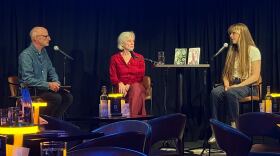What do McDonalds hamburgers and NPR underwriting have in common? Ray and Joan Kroc. One, a business tycoon responsible for building a world-wide brand and the other a strong woman with a passion for progressive causes. Today we’re learning about the odd couple pairing of a billionaire-entrepreneur and peace-loving philanthropist.
Plus, a collection of stories follows characters down the slippery slope of technological dependency - and how to slow it down.
Listen to the full show.
Ray and Joan
Joan Kroc famously made a $225 million bequest to NPR upon her death in 2003. Perhaps best known as the wife of Ray Kroc, the billionaire-entrepreneur behind the McDonalds franchise, Joan Kroc paved her own way as a philanthropist, donating generously to causes that would likely have made her late husband cringe. She is the subject of Lisa Napoli's new book Ray and Joan: The Man Who Made The McDonald's Fortune and The Woman Who Gave it All Away.
Fake News
Fake news travels fast. Even the most outrageous stories seem somehow more believable and clickable when passed along or posted by someone you know and trust. And the results can be devastating, as evidenced by yesterday's shooting at a Washington DC pizzeria, a place targeted by a man with an assault rifle investigating a fake news story about a child sex ring run by Hillary Clinton and her campaign chief.
After the election, Melissa Zimdars - assistant professor of communication and media at Merrimack College - started compiling a Google doc of news sites that didn't seem trustworthy. She posted the list on Facebook and it quickly went viral, and kicked up a storm, attacks against her - and a source for accusations against Facebook and Google.
Children of the New World
What do you imagine when you think of the future? Jetpacks? Teleporting? In a new collection of short stories set in the near future, writer Alexander Weinstein follows the human drive for instant connection, technological gratification and environmental degradation to unsettling extremes. A family grieves the loss of a lifelike android son and big brother. Tourists flock to Nepal to download synthetic enlightenment at bargain prices. And in an American heartland stripped of its topsoil, farmers contemplate turning their children into commodities. The stories present a future that is disquieting in its probability.
Alexander Weinstein is director of the Martha's Vineyard Institute of Creative Writing and author of the collection, called Children of the New World.
Children of the Magenta
Science fiction often explores the implications of technology on human communications and relations - but it also paints a picture of a future where humans are at the mercy of technology they don't totally understand. As producers Roman Mars and Katie Mingle from the podcast 99% Invisible point out in this story, we don't need to look into the future to see the deadly results of relying too much on automated technology.
You can listen to this story again at PRX.org.







